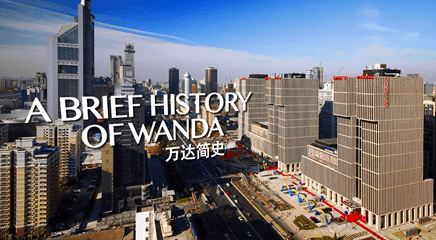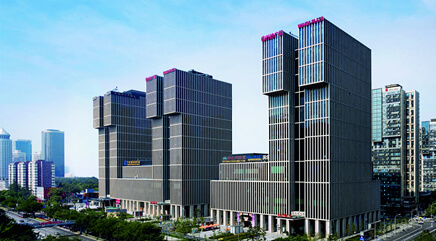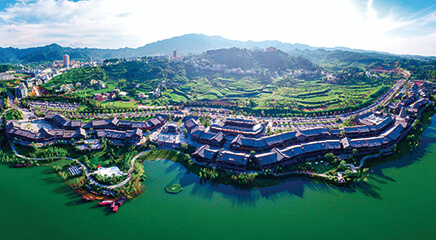Chairman Wang Jianlin Gives A Speech on Globalization of Chinese Culture
10.12.2016 Wanda Group Chairman Wang Jianlin gave a speech on “Globalization of Chinese Culture” at China Entrepreneur Annual Meeting on December 10, 2016 in Beijing. The following is the transcript of his speech. For Q&A part, please click: Q&A
Wanda Group Chairman Wang Jianlin gave a speech on “Globalization of Chinese Culture” at China Entrepreneur Annual Meeting on December 10, 2016 in Beijing. The following is the transcript of his speech. For Q&A part, please click: Q&A
Wang Jianlin: the main topic that I will be speaking about is the globalization of Chinese culture, focusing on three main points.
The first main point: Why does Chinese culture need to be more international? The first main point has three parts:
First, only soft power is capable of winning over the hearts of people. Everybody knows that a leading economist from the West has divided the concept of a country’s power in to soft power, and hard power, with hard power being a country’s economic foundation, military might etc... Soft power is culture, education, and many other aspects such as sports etc. When considering all of the different aspects of soft power, Culture is the most essential part. Hard power will never be able to truly influence and win over the hearts of people; this can only be done through soft power. Hard power is only good for winning wars, and will never be capable of truly winning the respect of people.
I want to give you two examples: when we were at the beginning of the flourishing Tang Dynasty, the use of soldiers was rarely required; however, people came from all over the world, and at the time, X'ian was the most prosperous city in the entire world. So what attracted the world to the Tang dynasty? During the Tang dynasty, our culture was the most advanced, and we possessed numerous inventions and commodities for exchange, such as silk. The only way to truly influence people is through the finest things that make up culture.
Secondly, in regards to increasing the influence of China, we need to start from the misguided isolationist policies of Emperor Qianlong which were implemented three hundred years ago. From that time until today, it has approximately been three hundred years. And during those three hundred years, China’s power and influence slowly declined while many of the Western countries rose to prominence. The lifestyles and culture from dominant Western powers has had a far-reaching influence on China, often creating a certain sense of awe and worship of things that are foreign. No matter what award is bestowed, whether it is a movie or music award, or even an award in literature, whatever is foreign is somehow better. Whatever Chinese people do, there is a lack of confidence.
Now, Chinese people are talking about a great national rejuvenation, with the most important emphasis being placed on the area of culture: to go from influencing China to “China’s Influence”. Merely depending on economic influence is not enough. globalization requires the successful combination of soft and hard power. Only then, can we truly experience a rejuvenation of Chinese culture.
Third: the only way to cultural self-confidence. Chinese culture must become more international, this is at the essence of increasing our cultural self-confidence. Chinese culture must be compared and appreciated through interacting with other cultures, there is a philosophical term for this, “the Origin of Spirit.” Absorb the good and separate the wheat from the chaff, constantly improving ourselves. Only then, can we truly rebuild our cultural and national sense of pride. I remember a saying by Mao Zedong, “differentiation comes through contrast, and without differentiation there is no progress,” this is the logic behind interaction.
The second main point: How to internationalize culture? I will share with you some of my personal views on the matter.
(1) You need to establish channels of communication. When Chinese culture is spread abroad today, there are major limitations with the existing channels of communication, whether in the form of movies, TV, the Internet, or surface level interactions. Our voices are not being heard by the majority of foreigners. When you are abroad, and see something in the news about China, it normally has to do with something negative. Some tourists come to China, and have a more realistic image of China, but this is a minority. So we need to establish an efficient way for the world to understand China.
Let me give you an example. I am not sure how many film production companies exist in the world, but only six have global distribution channels. This is the core competitive strength of these six companies, known as the “Big Six.” Some companies, measured in terms of income from movies and T.V., might even be higher than two or three of the Big Six. But they are not considered “Big” because they have no global distribution channels.
Can movies from China rely on the distribution channels of these six foreign companies to become more international? The answer is no. Let me give you another example. In recent years, there has been no overseas box office growth from Chinese movies, why is that? Income from overseas does not match up with the Chinese market, with too few overseas box office films from China. After the AMC acquisition by Wanda in 2012, some Chinese movies were shown throughout the United States and North America. Some movies are filmed in China, and then the premiere is shown in Beijing or Shanghai. These so called international premieres are quite misleading as they are clearly not global events.
(2) The need for building content brands. Other than channels of transmission, an important factor is brand recognition. American culture has influenced the entire world. America is not merely an economic power; their cultural influence is even stronger.
The largest American export is not planes or any other thing, it is culture. The American culture industry represents 24% of their GDP, and is ranked number one. The production value of America’s cultural GDP is 1/4 of the entire worlds, having a major impact on the rest of the world.
To increase the global influence of Chinese culture we need to firmly establish our own channels of transmission. We also need to develop a strong, globally recognized brand. Just having a method of transmission is not enough.
(3) Relying on private enterprises. What does cultural influence rely on? It is a given that the government should be one of the driving forces, increasing the international influence of Chinese culture. But the government’s influence is primarily through financial investments. In terms of the breadth, depth, and long-term influence of culture I think that it will take more than just the government promoting Chinese culture.
It is hard for state owned enterprises to go abroad. Why is it hard for state owned enterprises to go abroad? State owned enterprises represent China, and when it comes to going abroad, approval and regulations is already a big obstacle. State owned enterprises are a sensitive issue when it comes to culture. For example, to acquire England’s Odeon, the largest cinema network in Europe. You need the approval of ten to twenty different countries from the EU. It should all be approved by now, as we received the official approval documents last week. If you were a state owned enterprise, you would certainly be limited by regulation, especially when there are so many countries involved.
Secondly, there is less resentment while spreading culture. Because private enterprises are se






